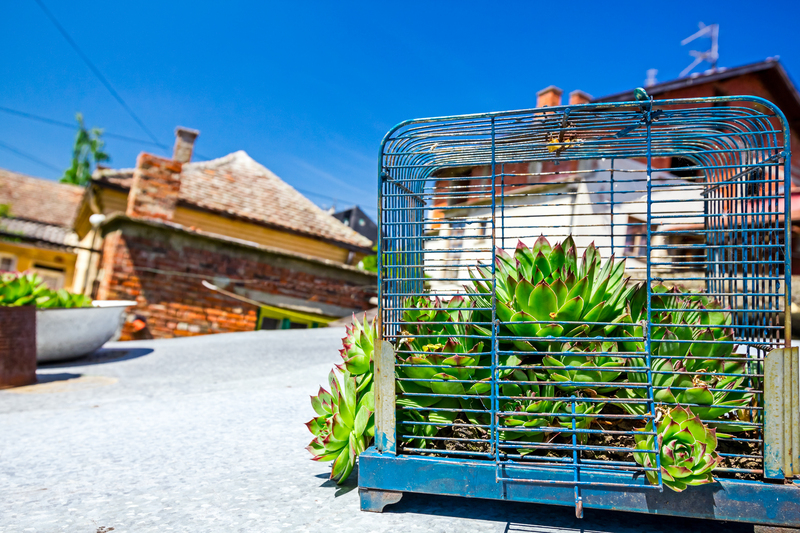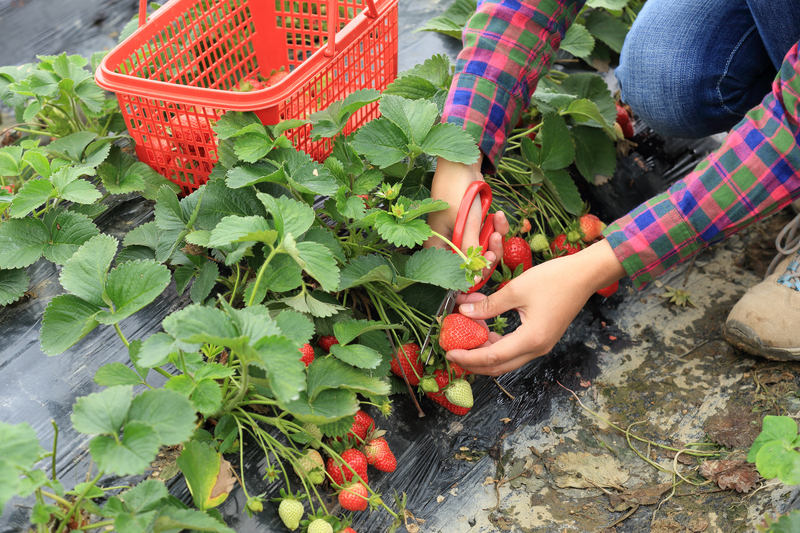Waste to Fertility: The Journey of Organic Transformation
Posted on 26/08/2025
Waste to Fertility: The Journey of Organic Transformation
In a world increasingly aware of environmental sustainability and resource conservation, the concept of transforming waste into fertility is gaining significant momentum. The journey of organic transformation involves turning organic waste--such as kitchen scraps, animal manure, yard debris, and agricultural residues--into fertile, nutrient-rich compost and organic fertilizers. This remarkable process not only diverts trash from landfills but also rejuvenates soils, supports sustainable agriculture, and contributes to a healthier planet.
Understanding Organic Waste: The Foundation of Fertility
To fully appreciate the waste to fertility journey, it's crucial to understand the different types of organic waste and their roles in the nutrient cycle. Organic waste refers to materials derived from living organisms that are biodegradable. Common sources include:
- Food scraps: Vegetable peels, fruit rinds, coffee grounds, eggshells, and more
- Yard waste: Grass clippings, leaves, branches, and garden trimmings
- Agricultural residues: Crop stalks, husks, and other plant remnants
- Animal manure: Livestock dung and poultry litter
When left untreated, these wastes can release greenhouse gases as they decompose in landfills, contributing to environmental issues. However, with organic transformation techniques, they can become valuable resources for soil enrichment and crop production.

The Science and Art of Composting
Composting: Nature's Recycling Engine
At the heart of organic transformation lies composting--a controlled, aerobic (oxygen-requiring) process that accelerates the natural decay of organic materials. Through composting, microorganisms (bacteria and fungi), invertebrates (earthworms, insects), and even larger decomposers break down waste components, producing a stable, humus-rich amendment for soils.
The Key Stages of Composting
Composting is an intricate dance of biology and chemistry comprising several stages:
- Mesophilic phase: Moderately warm temperatures as bacteria begin to digest sugars and starches.
- Thermophilic phase: Increased heat generation as microbes break down proteins, fats, and complex carbohydrates; temperatures can reach 55-70?C (131-158?F), killing most pathogens and weed seeds.
- Cooling phase: Activity shifts back to mesophilic organisms as easily digestible material becomes scarce.
- Maturation/curing phase: The compost stabilizes, further decomposition occurs, and nutrient-rich humus is formed.
This transformation can take anywhere from a few weeks to several months, depending on the method and materials used.
Benefits of Composting in Organic Waste Treatment
- Reduces landfill waste and environmental pollution
- Produces natural fertilizer without synthetic chemicals
- Enhances soil structure, water retention, and aeration
- Boosts soil fertility by enriching it with essential nutrients
- Promotes healthy plant growth and improves crop yields
From Decomposition to Nutrient-Rich Soil: The Role of Microorganisms
The magical transformation from waste to fertility depends significantly on the activities of trillions of microorganisms. Bacteria and fungi are the unsung heroes, breaking down complex organic materials into simple, plant-available compounds.
The Microbial Army in Action
- Bacteria: Primary decomposers that quickly process sugars, amino acids, and proteins
- Fungi: Break down tough plant fibers like cellulose and lignin (found in woody materials)
- Actinomycetes: Bacteria-like organisms with a vital role in decomposing complex polymers and producing earthy-smelling humus
- Macro-organisms: Earthworms, insects, and other detritivores that physically fragment organic matter
Their continuous work ensures that organic matter recycling produces high-quality compost and biofertilizers, essential for healthy soils.
Various Approaches to Organic Waste Transformation
Backyard Composting
Backyard composting is a simple and accessible method for households. By layering "greens" (nitrogen-rich materials like food scraps) and "browns" (carbon-rich materials like dry leaves), maintaining moisture, and turning the pile for aeration, even small-scale gardeners can create fertile compost. This process demonstrates how organic waste transformation doesn't require industrial setups.
Vermicomposting: Harnessing the Power of Worms
Vermicomposting employs special composting worms (typically Eisenia fetida, or red wigglers) to process organic matter. Worms ingest and digest waste, producing vermicast--a nutrient-dense, microbially active compost. Vermicomposting is ideal for urban or indoor setups, making waste-to-fertility transitions possible almost anywhere.
Industrial and Municipal Composting
For communities and large businesses, municipal composting facilities manage tons of organic waste efficiently. These operations often employ windrows, static piles, or in-vessel systems to process waste on a massive scale, supporting sustainable agriculture at regional levels while reducing landfill burdens.
Other Innovative Techniques
- Bokashi fermentation: An anaerobic (airless) process using beneficial microbes to quickly ferment kitchen waste, producing both compost and nutrient-rich liquid
- Black soldier fly larvae: Larvae rapidly consume food waste, producing protein-rich animal feed and organic fertilizer as byproducts
- Biochar production: Charring organic waste at high temperatures creates biochar, a porous material that improves soil fertility and sequesters carbon
The Benefits of Organic Transformation: Waste as a Resource
Transmuting waste into fertility offers a multitude of benefits, at both local and global scales. Here's why the journey of organic transformation matters:
- Ecological sustainability: Composting and biofertilizer production reduce greenhouse gas emissions associated with landfilling organic waste, helping combat climate change.
- Soil regeneration: Regular addition of organic matter revives depleted soils, enhances beneficial microbial life, and restores natural fertility cycles.
- Improved crop health: Compared to chemical fertilizers, compost releases nutrients slowly and steadily, improving crop resilience and reducing risks of nutrient leaching.
- Supports circular economy: Organic waste recycling keeps valuable nutrients circulating in agricultural and food systems, minimizing resource extraction.
- Empowers communities: Backyard and community composting fosters environmental stewardship, education, and self-reliance in food production.
- Reduces dependency on chemical fertilizers: Less reliance on synthetic inputs translates to healthier ecosystems and reduced agricultural pollution.
Overcoming Challenges in the Waste-to-Fertility Journey
While the advantages of organic waste transformation are clear, some challenges must be addressed to optimize the process on a broader scale:
- Contamination: Presence of plastics, metals, and toxic chemicals in waste streams can hinder compost quality and safety.
- Lack of awareness: Many individuals and organizations aren't informed about composting methods or the benefits of soil recycling.
- Infrastructure limitations: Not all municipalities offer curbside organic waste collection or dedicated composting facilities.
- Time and labor: Composting requires careful management of inputs, moisture, and aeration, which can deter participation without proper education.
Innovative solutions such as improved waste sorting, education campaigns, and incentives for composting can help overcome these obstacles, making the organic transformation process more accessible for all.
Steps for Effective Organic Waste Composting At Home
If you're interested in converting your own waste into fertility gold, follow these actionable steps:
- Designate a compost bin or pile in your backyard or garden area.
- Collect greens: Fruit and vegetable peels, coffee grounds, fresh grass clippings, manure (if appropriate).
- Balance with browns: Dry leaves, shredded newspaper, straw, and cardboard and other carbon-rich materials.
- Layer materials alternately, moistening dry layers as you build.
- Turn the pile every week or two to supply oxygen and accelerate decomposition.
- Monitor moisture: Compost should feel like a wrung-out sponge; not too wet, not too dry.
- Check temperature: A hot pile (40-60?C/104-140?F) signals active breakdown; let it cool before curing.
- Harvest and cure: After decomposition slows and the pile cools, let compost cure for several weeks for maximum stability and nutrient value.
Applications of Recycled Organic Fertility
Once the organic transformation process is complete, the resulting compost and biofertilizers offer diverse applications:
- Soil amendment: Enriches garden beds, farms, lawns, and landscaping projects
- Mulching: Retains moisture and insulates plant roots
- Seed starting mixes: Provides rich, balanced media for young plant growth
- Potting soil: Blended with other materials for use in containers
- Land restoration: Revitalizes degraded or contaminated soils, promoting ecosystem recovery

The Future of Waste to Fertility: Innovations and Hope
As awareness grows about organic waste recycling and fertility transformation, new technologies and initiatives are emerging:
- Compostable packaging: Innovations in bioplastics and plant-based packaging materials help ensure more waste can safely re-enter the compost stream.
- Smart composters: Automated devices for homes and businesses monitor moisture, temperature, and mixing, making home composting more accessible than ever.
- Urban agriculture: Cities are transforming vacant lots into fertile urban farms, powered by locally produced compost made from food and green waste.
- Policy and incentives: Governments offer tax breaks, grants, and education to encourage composting and organic waste transformation at every level.
- Research breakthroughs: Studies into soil microbiomes and plant nutrition are refining compost recipes for optimized fertility and sustainability.
Conclusion: Nature's Cycle of Renewal
The journey of organic transformation--from waste to fertility--stands as a testament to nature's wisdom and our ability to harness it for sustainability. By recycling organic matter through composting and similar processes, we not only reduce landfill waste but also restore soils, increase food security, and build healthier communities.
Whether you're a home gardener, a farmer, a policymaker, or an eco-conscious consumer, engaging in organic waste recycling helps forge a circular, resilient future. Embrace the journey; your food scraps and yard debris are not just waste--they're the seeds of tomorrow's fertility.
Start your own organic transformation today and become a steward of soil and sustainability!
Latest Posts
Hedge Trimming Techniques for a Harmonious Garden Layout
Breathe Peace: Design Your Perfect Zen Garden Sanctuary
Enchant Kids with a Colorful and Safe Garden
A Guide to Successful Container Gardening
Gardening: The Unsung Hero in the Battle Against Climate Change

